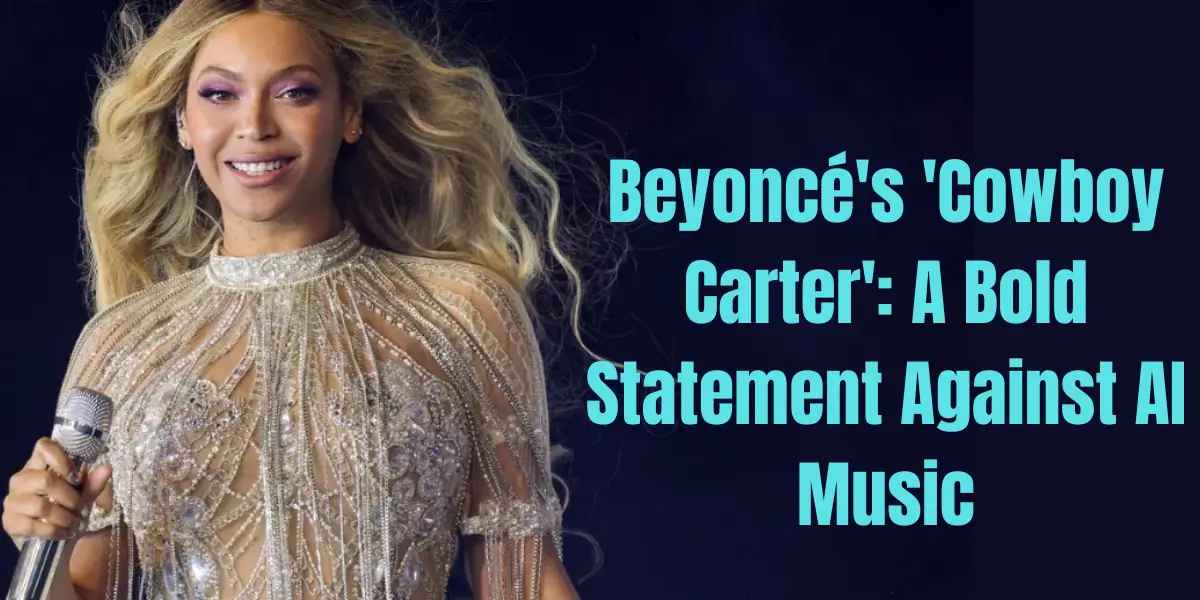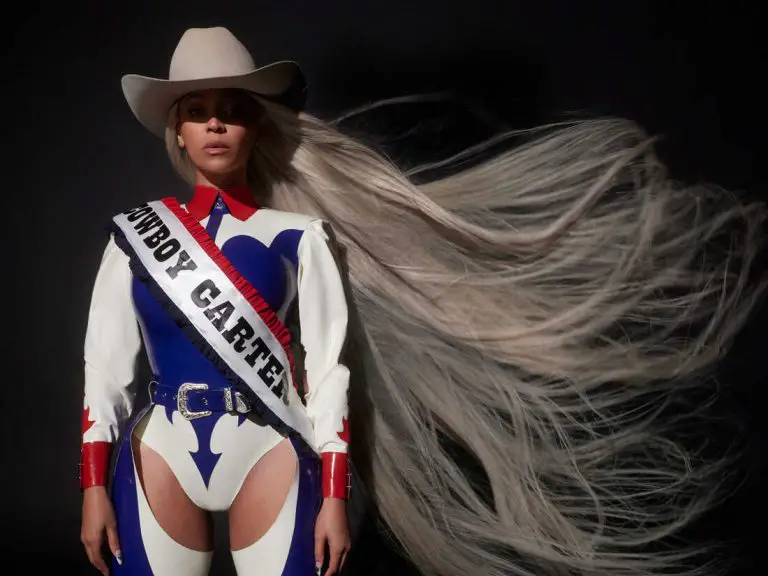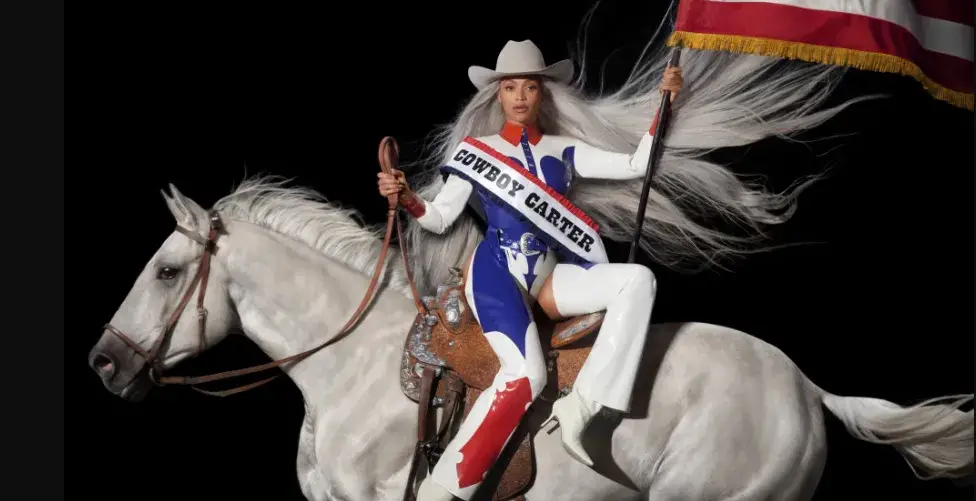Beyoncé's 'Cowboy Carter': A Bold Statement Against AI Music

In an era where technology incessantly intertwines with creativity, Beyoncé’s latest masterpiece, “Cowboy Carter,” stands as a defiant testament to the power of human artistry. With this album, Beyoncé not only breaks records but also barriers, challenging the growing influence of artificial intelligence in the music industry.
Beyoncé’s “Cowboy Carter” stands as a bold declaration in the face of AI’s encroachment on music, championing authenticity, artistic integrity, and the irreplaceable human touch. Through this album, Beyoncé not only challenges the industry’s direction but also reclaims the narrative, emphasizing the importance of real instruments and human creativity in crafting music that resonates deeply with listeners.
Table of Contents
What is 'Cowboy Carter'?

Spanning a diverse array of sounds and stories, “Cowboy Carter” is Beyoncé’s homage to the roots of music— a celebration of authenticity over artificiality. At the heart of the album lies a deep-seated resistance to the encroachment of AI in creative processes, marking a pivotal moment in Beyoncé’s illustrious career. Through “Cowboy Carter,” Beyoncé advocates for the irreplaceable value of human touch in music creation, a stance that’s both personal and political.
As we transition from understanding the essence of “Cowboy Carter,” it’s imperative to delve deeper into why Beyoncé is taking a stand against AI music.
Why is Beyoncé Taking a Stand Against AI Music?

Beyoncé’s position against AI music is not a mere personal preference but a deeply rooted stance reflecting concerns over artistic integrity, authenticity, and the broader implications of technology on creativity. As a globally recognized artist with a considerable influence, her voice adds a significant weight to the ongoing debate about the role of AI in the music industry. Through her latest album, “Cowboy Carter,” Beyoncé not only showcases her commitment to traditional music production methods but also ignites a conversation on the future of music in an AI-driven era. This section explores the multifaceted reasons behind Beyoncé’s stand, delving into the essence of what makes music truly resonate with the human spirit.
The Quest for Authenticity
In a digital age where replication and simulation are commonplace, Beyoncé champions the authenticity that comes from human-created music. Her advocacy for real instruments and organic sound production stems from a belief that music, at its core, is an expression of the human experience — nuanced, flawed, and beautiful in its complexity. Beyoncé’s rejection of AI in music underscores her commitment to preserving the soul and essence of musical expression, which AI-generated content often lacks. This quest for authenticity is a call to return to the roots of music creation, where the artist’s touch, emotion, and intent are palpable in every note and melody.
Protecting Artistic Integrity
Beyoncé’s stand against AI music also highlights concerns over artistic integrity. The advent of AI technologies capable of creating music independently or mimicking existing styles threatens to blur the lines between original human creation and artificial reproduction. Beyoncé views the introduction of AI in music as a potential diminishment of the unique, creative voice of artists, where the line between inspiration and imitation becomes indistinguishably thin. Her stance is a protective measure against the commodification of music, where artistic creation is at risk of being reduced to algorithmically generated outputs devoid of personal narrative and depth.
Advocating for Artists’ Rights
At the heart of Beyoncé’s opposition to AI music is a strong advocacy for artists’ rights. The use of AI technologies often involves training models on vast amounts of copyrighted material without explicit consent from the creators. This practice raises ethical and legal concerns about copyright infringement and the fair compensation of artists. Beyoncé’s stand serves as a voice for the countless artists whose work contributes to the development of AI without acknowledgment or remuneration. By taking a public stance, she sheds light on the need for transparent and equitable practices within the industry, emphasizing the importance of recognizing and compensating artists’ contributions in the age of AI.
How Does Authentic Music Production Differ from AI?
The Human Element
The most striking difference between authentic music production and AI lies in the human element. Music created by artists carries the weight of their emotions, stories, and personal journeys, offering a level of depth and connection that AI cannot replicate. The nuances of human creativity, from the imperfections in a vocal performance to the spontaneous changes in composition, add a layer of authenticity and relatability to music. Authentic music production is a reflection of the human condition, capturing the complexities and variances of emotion and experience that define our existence.
Creative Process
Unlike AI, which operates within the confines of programmed algorithms and data sets, the human creative process is boundless, driven by inspiration, intuition, and the unpredictable nature of artistic expression. Authentic music production involves experimentation, risk-taking, and serendipitous discoveries, elements that are inherently human and cannot be programmed into an AI. This process allows for the creation of music that is innovative, unique, and reflective of the artist’s true voice, offering listeners a genuine connection to the music and its creator.
Connection with Listeners
Music produced by humans possesses an innate ability to connect with listeners on a profound level, conveying emotions and experiences that resonate with the human spirit. This connection is rooted in the shared experiences and emotions that music can evoke, creating a bridge between the artist and the audience. AI-generated music, while technically competent, often lacks the emotional depth and personal touch that facilitate this deep connection. Authentic music production ensures that music remains a medium of genuine expression and connection, touching the hearts and souls of listeners in ways that AI cannot replicate.
What Issues Do Artists Face with AI in Music?
The integration of AI into the music industry presents a series of challenges and concerns for artists, from issues of copyright and creativity to economic implications. As AI technologies become more advanced, artists are confronted with the reality of navigating a landscape where their creative output, livelihood, and control over their work are at stake. This section examines the key issues artists face in the era of AI music, highlighting the complexities of this technological advancement on the creative industry.
Loss of Identity
One of the most significant challenges artists face with the advent of AI music is the potential loss of identity. AI’s ability to mimic artists’ styles and voices raises concerns over the dilution of individuality and the unique essence that defines each artist’s work. This technology blurs the distinction between original creation and artificial reproduction, leading to a homogenization of music that undermines the diversity and uniqueness of artistic expression. Artists risk losing the very aspects of their music that connect with audiences on a personal level, as AI-generated content could overshadow human creativity.
Economic Impacts
The rise of AI in music also poses economic challenges for artists. As AI technologies enable the production of music at a faster pace and lower cost, the value of original music created by humans may be undercut. This shift could lead to reduced opportunities for artists to monetize their work, impacting their ability to sustain a livelihood through music. The ease of creating and distributing AI-generated music threatens to flood the market, making it increasingly difficult for artists to stand out and compete in an already saturated industry.
Ethical Concerns
Ethical issues surrounding the use of AI in music are paramount concerns for artists. The training of AI models often involves the use of copyrighted material without consent, infringing on artists’ rights and raising questions about the legality and morality of such practices. Furthermore, the potential for AI to replace human creativity prompts a broader ethical debate about the value of art and the role of technology in creative processes. Artists are at the forefront of advocating for ethical standards in AI music production, seeking to ensure that their work is respected and protected in the digital age.
How Does 'Cowboy Carter' Address Artistic Theft?
Beyoncé’s “Cowboy Carter” transcends mere musical innovation, embodying a profound commentary on the theft and appropriation of artistic works. In an industry increasingly influenced by digital replication and AI, Beyoncé utilizes this album as a medium to spotlight issues of artistic theft, particularly within the realms of culture and music. By weaving together narratives that honor the roots of music genres and challenge the ongoing appropriation, “Cowboy Carter” serves as both a tribute and a call to action. This section delves into the multifaceted ways in which the album confronts these issues, shining a light on the importance of acknowledging and respecting the origins of artistic contributions.
Celebrating Historical Contributions
“Cowboy Carter” meticulously highlights the historical contributions of Black artists to country music, a genre often perceived as predominantly white. By doing so, Beyoncé not only educates her audience about the true origins of country music but also addresses the systemic erasure and appropriation of Black artists’ work. This acknowledgment acts as a counter-narrative to the dominant cultural stories, bringing to the forefront the often overlooked contributions of Black musicians in shaping genres and influencing the music landscape.
Critiquing Cultural Appropriation
Through “Cowboy Carter,” Beyoncé critiques the appropriation of Black music by mainstream culture without proper recognition or compensation. The album’s thematic and lyrical content serves as a poignant commentary on how elements of Black culture have been co-opted by the wider industry, often diluting their origins and significance. By reclaiming these narratives within her music, Beyoncé underscores the importance of honoring and preserving the authenticity of cultural expressions, challenging the industry to acknowledge and rectify historical injustices.
Advocating for Artistic Integrity
Beyoncé’s album stands as a testament to the power of artistic integrity in the face of widespread appropriation and theft. “Cowboy Carter” exemplifies how artists can use their platforms to challenge the status quo, advocate for the rights of creators, and promote ethical practices within the industry. Beyoncé’s deliberate choice to address these issues through her music underscores the role of artists as advocates for change, highlighting the need for a collective effort to protect artistic works from exploitation and theft.
What Impact Does AI Have on the Music Industry?
Transformation of Production Methods
AI has revolutionized music production, making it possible to generate compositions, lyrics, and even vocal performances with increasing sophistication. This shift introduces both creative possibilities and challenges, allowing for greater experimentation but also raising concerns about the devaluation of human creativity. As AI technologies become more integrated into the creative process, the industry grapples with the balance between embracing innovation and preserving the irreplaceable value of human artistic expression.
Economic Implications
The impact of AI on the music industry’s economic landscape is profound. AI-generated music, with its lower production costs and the ability to rapidly produce content, could potentially saturate the market, affecting the livelihoods of traditional artists. The democratization of music production through AI tools also challenges existing revenue models, prompting a reevaluation of how value is assigned and shared within the industry. Artists and industry stakeholders are thus faced with navigating a rapidly evolving economic environment shaped by technological advancements.
Ethical and Legal Challenges
AI introduces a myriad of ethical and legal challenges, particularly concerning copyright and the use of copyrighted material without consent. The practice of training AI on existing music without proper authorization highlights issues of intellectual property rights and compensation. Furthermore, the potential for AI to create works that closely mimic the style of existing artists without clear attribution or compensation raises ethical questions about authenticity and artistic theft. The industry must address these challenges to ensure fair and ethical practices in the age of AI.
Why Are Real Instruments Important to Beyoncé?
For Beyoncé, the use of real instruments in music production is not just a preference but a fundamental aspect of her artistic identity and philosophy. “Cowboy Carter” showcases her commitment to authentic soundscapes, emphasizing the tactile and emotional connection that real instruments bring to music. This dedication speaks to a broader stance on the importance of preserving musical traditions and the unique qualities that live instrumentation adds to the creative process. Here’s why real instruments hold such significance for Beyoncé:
- Real instruments carry a richness and depth that electronic or AI-generated sounds often fail to replicate. They provide a warmth and organic feel, contributing to the emotional impact of music.
- The use of live instruments fosters a connection to musical heritage and tradition, bridging past and present and honoring the roots of various genres.
- Playing and interacting with real instruments offer an element of unpredictability and spontaneity, enhancing the creative process and allowing for serendipitous moments that can define a track.
- Real instruments facilitate a tangible connection between musicians, their instruments, and the audience, fostering a shared experience that deepens the listener’s engagement with the music.
What Does the Future Hold for Music Production?
The future of music production is poised at the intersection of tradition and technology, where the potential of AI to transform creative processes coexists with a renewed appreciation for the authenticity of human-generated music. As we move forward, the industry is likely to see a hybrid approach, where AI and human creativity collaborate to push the boundaries of what is musically possible. However, the core of music production will remain anchored in the human experience — the emotions, stories, and cultural contexts that artists bring to their work. This future landscape will demand a delicate balance, ensuring that technology serves to enhance rather than replace the irreplaceable human element at the heart of music. The challenge will be to navigate these advancements while preserving the essence of music as a form of genuine human expression, ensuring that the soul of music remains undiminished in the face of relentless technological progress.
Conclusion
“Cowboy Carter” is more than just an album; it’s a statement, a movement, and a call to action. Beyoncé’s bold stance against AI music underscores the irreplaceable role of human creativity in the arts. As we look to the future, her message is clear: technology should serve to amplify, not replace, the unique voice of the artist.

